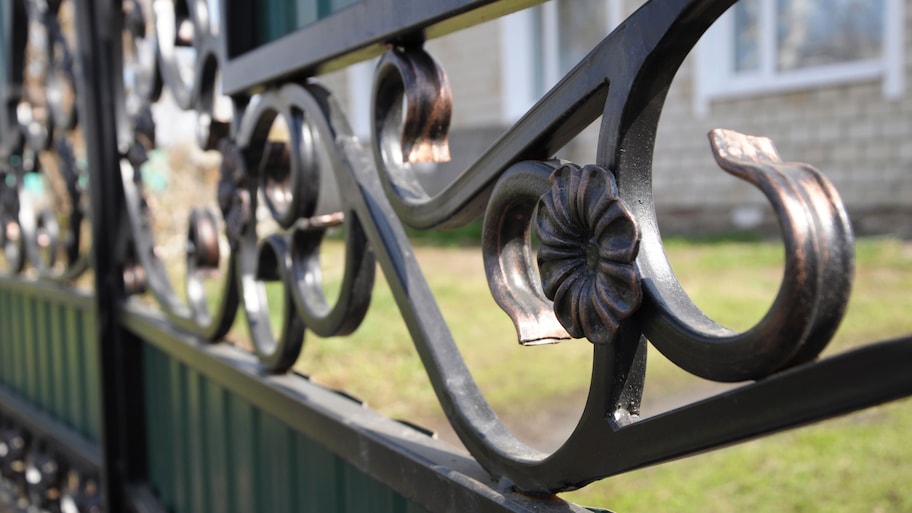Find the fence that fits
Whether you plan on tackling the project yourself or hiring a pro, installing a fence is a big decision. There are a variety of fence styles and materials and they can serve many purposes, so take some time to weigh the pros and cons of different yard fencing options.
What to Consider Before Choosing a Fence
When deciding on a fence type for your yard, there are a few factors to take into consideration before purchasing materials or booking a fence installation.
Purpose of the Fence
Think about the reasons you want to install a fence when planning. You may want to install a fence strictly to protect your family or contain your furry friends. Or maybe you’re looking to add a decorative touch to your yard to boost your curb appeal.
To add security
To contain pets
To create more privacy
To define property lines
To block wind
To block sound
To boost curb appeal
To increase resale value
Style Preferences
Fences come in different materials, styles, and color options. Think about your personal style preferences, the style of your home, and overall neighborhood aesthetic when planning.
Your Budget
Installing a fence is a more costly project and your individual budget plays a big role in your decision-making process. The cost of installing a fence can widely vary depending on many factors such as materials, the amount of property you’re trying to fence in, the time of year, and your geographic location.
If you hire a pro to do the job, you will need to budget for permits, materials, and labor, which can average about $50 an hour (and can increase in cost if your property has limitations or is more difficult to work in).
The cost of materials can significantly range from $1,000 per acre for basic types of fence materials (like chain link fencing) to upwards of $5,500 per acre for composite. If you want to add customizations like gates or increase the height of the fence, your cost can go up.
HOA and Neighborhood Regulations
If applicable, you may live in a community that is regulated by an HOA (Homeowners Association). Moreover, counties, cities, and towns often have restrictions for fence installations on your property, so it's important to work within the limitations when choosing your fence type. Here are a few common regulations you may have to work with:
Fence height
Style and cohesiveness with the rest of the community
Weather resistance depending on geographic area
Color options
Requires professional installation
Distance from your property line
7 Popular Types of Fences
To help you decide which type of fence to choose for your home, check out the pros and cons of each popular fence type.
1. Wood Fences

Wood is a common type of fence material that can serve multiple purposes while appealing to many tastes. Wood fences are most often made from cedar and pine, but fir, cedar, redwood, and spruce can also be used.
You can choose from different fence styles like lattice patterns, picket designs, or vertical dog ear fence panels (when the tips of the wood boards are cut at a slanted angle). Or choose horizontal slat fencing for a contemporary look.
Make a style statement with color, such as dark wood for a more modern style or natural wood for a rustic feel. Also, you can sand down the fence and stain or paint it different colors to switch up the look.
Compared to other materials, wood is one of the more affordable options. Keep in mind, however, wood is sensitive to the elements and weather fluctuations. It's prone to fading and requires regular maintenance every few years, so account for the cost of staining the fence and upkeep when budgeting.
Pros
Affordable
Easy to stain or paint
Certain types offer more privacy
Acts as a sound barrier when installed high enough and without gaps in the panels
Cons
Sensitive to elements and will eventually rot
Routine maintenance is required, such as staining
Susceptible to pests like termites
May need to replace boards or panels when damaged
2. Composite Fences

Composite is a blend of wood and plastic polymers that can be used for both fencing and decking. Because it can be made from recycled materials, it’s an environmentally friendly option. Composite fencing comes in various styles and colors, and you can install it vertically for a traditional look or horizontally for a modern aesthetic. Of the other fence options, it’s a material that is on the more expensive side and requires professional installation, so keep this in mind when budgeting.
Pros
Environmentally friendly
Low maintenance
Long-lasting and often warrantied
Various color options available
Cons
Can't be painted
Factory color can fade
More expensive than other types
Prone to mold
Can expand or shrink depending on the temperature
3. Aluminum Fences

Aluminum fences are low-maintenance, strong, and easy to install, making them a good choice for a wide range of fence installation projects. Because aluminum is lightweight and malleable, it can be installed on either a flat or sloped land. Compared to other types of fence materials, it’s both fade- and moisture-resistant. Moreover, powder-coated aluminum fences provide protection from rust and prevent the paint from peeling and chipping.
Most often, aluminum fencing comes standard with spacing between the fence poles, making this a less ideal option if you’re seeking more privacy and security. However, if you are looking for a visually appealing way to section off your property, this is a great choice for an ambitious DIY project.
Pros
More affordable over time as less upkeep is required
Lightweight
Could be a DIY project
Durable
Requires less maintenance
Cons
Doesn't offer privacy
Can bend easily
Higher-grade aluminum is more expensive
Does not hold up well in extreme weather conditions
4. Wrought Iron Fences

Wrought iron is a type of metal fencing that can add an elegant and decorative look to your home. Because it has an extensive manufacturing process, crafted by a blacksmith reheating the iron repeatedly, it’s extremely strong and has a long lifespan. Pure wrought iron is no longer commercially available and has been replaced by steel. However, you may be able to put pieces of existing fencing together to create a custom fence in your yard. Sometimes, you can purchase wrought iron in small quantities for restoring or conserving a property.
While an expensive option, you can use this type of fencing for gates and fences in smaller areas such as gardens or entryways. Read on to learn more about ornamental metal fencing, which has replaced traditional wrought iron fencing in most modern-day uses.
Pros
Strong and durable
Long-lasting
Visually appealing and elegant
Custom made
Used for conserving or restoring properties authentically
Cons
One of the most expensive fence types
Extremely heavy
No longer commercially manufactured
5. Ornamental Metal Fencing

If you like the look of wrought iron but want a less expensive and commercially-available option, consider an ornamental metal fence. Steel replaced wrought iron during the Industrial Revolution but can share the same aesthetic. Steel metal fencing is still a strong type of material and can add heightened security and protection.
Pros
Less expensive than wrought iron
Provides a visually pleasing aesthetic
Can be manufactured in large quantities
Lightweight
Long lasting and warrantied in many circumstances
Cons
Higher upfront investment than other materials
Compared to wrought iron, may need to be replaced earlier
Not as durable or strong as iron
6. Chain Link Fences

Chain link fencing is a tried-and-true way to section off your property and create a barrier of entry. In certain cases, this type of fence can be installed by confident homeowners over the course of a weekend. Chain link fence covering is a popular option for containing animals or children and defines property lines in your yard. It can also be used on sloped properties when the line posts are installed further apart.
Pros
Affordable
Doesn’t block views
Easy to install
Low maintenance
Cons
Less secure
Doesn’t offer wind or sound resistance
Does not increase resale value as much as other materials
7. Vinyl Fences

Vinyl fencing is a versatile option to enclose your yard and comes in a variety of styles and colors. Use a solid, tall vinyl fence to add privacy and security to your yard. Or, use a white picket style to enhance curb appeal and enclose your property. While this option has a higher upfront cost, over time it requires less maintenance, making this a cost-effective choice over its life. Keep in mind that the cost to install is higher because it requires precision, as imperfections in height are more evident.
Pros
Affordable
Durable
Low maintenance
Wide range of styles
Wind- and sound-resistant when installed without gaps in the panels
Cons
Installation cost is higher
Some versions can become brittle over time
Not heat- or fire-resistant
Not as environmentally friendly
Best Types of Fences
As each situation is unique, learn about the best fence types for your particular project.
Best for wind/weather resistance: Vinyl
Most affordable: Chain link
Easiest to install: Chain link or aluminum
Offers the most privacy: Wood or vinyl privacy fencing
Best for conservation or restoration: Wrought iron
Most durable: Vinyl
Most versatile: Aluminum
Most style options available: Wood or vinyl
Can be a DIY project: Chain link, wood, or aluminum
Least amount of maintenance required: Aluminum





